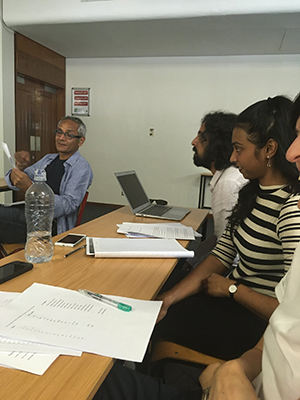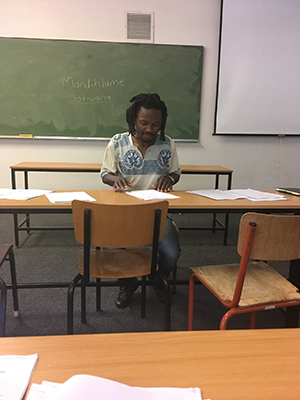
Since 2018, History Access has run IsiXhosa for Historical Research sessions. These sessions are led by Mandihlume Dotwana and in 2020 co-led by Sanele KaNtshingana . The sessions are intensive and roughly consist of 60 hours per year (12 sessions per semester every Thursday from 2-4:30pm). They are primarily aimed at the History Access Honours, Masters and PHD students, but also include History Access Postdoctoral fellows and select guests from other faculties.
At its inception, the course was intended at facilitating research with isiXhosa written materials. It is not aimed as a conversational course, but rather aims to equip young researchers in the History Access program with multilingual research methodologies and outlooks. This includes centering African epistemologies and intellectual texts through these weekly isiXhosa sessions.
The course speaks to History Access focus on questions of multilinguality and one of its key aims: the creation of a multlingual lexicon
As the course has developed, each weekly session focuses on key isiXhosa terms and concepts, and large emphasis is placed on socio-cultural and socio-historical meanings. This includes drawing from early 20th century black intellectual texts of scholars like WB Rubusana, William Wellington Gqoba, and SEK Mqhayi, but also looking at the everyday meanings of these terms in contemporary society.

Over the course of the past three years, the sessions have become a space of energy, learning and comradeship for History Access scholars and our beloved facilitator, Mandihlume Dotwana. uMandihlume facilitates each session, but it is an open space for all contributors, including first-language speakers of isiXhosa, speakers of other Nguni languages like isiZulu and isiNdebele, as well as those unfamiliar with isiXhosa.
The multilingual sessions have fostered an intellectual vigour and love not only for the isiXhosa language and concepts, but also for the collective endeavor of the broader project.
Importantly isiXhosa for Historical Research centers the idea that radical political, social and cultural meanings are embedded in isiXhosa terms and concepts. The sessions avoid translation-as–meaning, rather centering the academic value of terms and epistemological meanings in isiXhosa. The discussion-based method is also an attempt at crafting alternative forms of learning, historical knowledge and knowledge-making.
Examples of topics discussed in sessions across the past three years include: the exploration of terms like i-goduka and i-tshipha and their link to questions of labour and home, land-related vocabulary like ilizwe and isizwe, or the nature of the term ikhaya. Other sessions drew terms directly from isiXhosa intellectual texts such as Rubusana’s Zemk-iinkomo Magwalandini and Mqhayi’s Ityala Lamawele. One session in particular critically explored Mqhayi’s seminal poem Itshawe laseBritane and how the text gives insight into resistance against 19th and 20th century British settler colonialism.